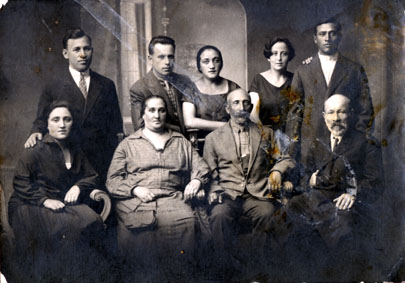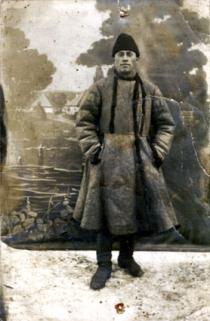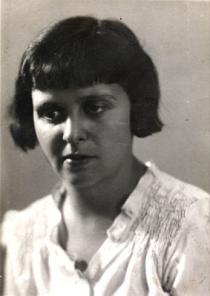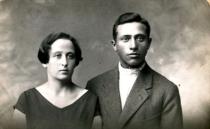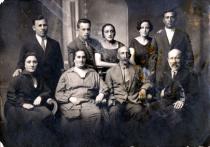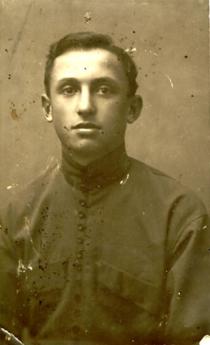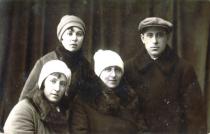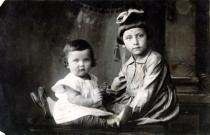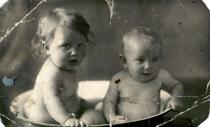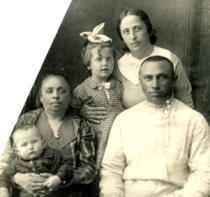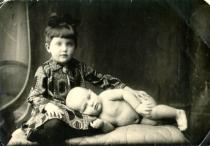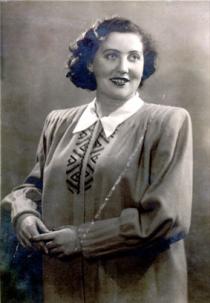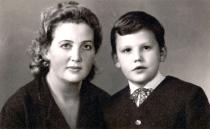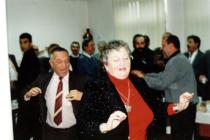My father's family. Lower row from left to right: my father's sister Lisa (Jewish name Livsha) Levitina (nee Mindel), my grandfather Simon-Yankel's second wife Miriam Levina-Mindel, my grandfather Simon-Yankel Mindel, my father sisters' father-in-law Levitin whose first name I don't remember. Upper row from left to right: Solomon Levitin (my father sister Lisa's husband), Yevsey Levitin (my father sister Sima's husband), my father's sister Sima Levitina (nee Mindel), my mother Fania Mindel (nee Silin). This photo was made in Nezhin in 1927.
All my maternal and paternal ancestors were born in this green town of Nezhin on the Ostyor river in Chernigov region in about 100 km from Kiev. My grandfather Mindel's branch of the family originated from Lithuania. Our ancestors moved to Nezhin in the late 18th century and we don't know any relatives in Lithuania. Grandfather Simon Yankel Mindel was a shoemaker. He was born to the family of Moisey Mindel, a shoemaker in Nezhin, in 1874. He kept hitting his little hammer sitting on a small shoemaker's stool all his life. My grandfather was very religious. He was a senior man at the synagogue and the Jewish community of the town respected him very much for his honesty. He was a wise and reserved man. My grandfather Simon Yankel sang beautifully. He was a tenor and sang at the synagogue. Now I understand that he was a cantor. I remember my grandfather singing children's songs in Yiddish. One of them was about a tailor singing a song and his needle followed his song. Sometimes he sang Ukrainian songs. He didn't know any Russian songs. My grandmother had strong will and was a very determined woman and my grandfather always obeyed her.
I often recall my paternal grandmother. I took from her all human values that I have. My grandmother Masia was born to the dynasty of butchers named Lempert in Nezhin in 1878. My grandmother adored her husband who sat there hitting his hammer while she was the breadwinner. She gave birth to eight children: three daughters and five sons, whom she was very proud of and adored them. In 1919, when my grandmother was 40 years old, my grandfather's brother Haim Iosif Mindel came from the front of the Civil War. He had typhoid. She isolated him from her family and shut herself in a room with him to nurse him. She brought him to recovery and died saving her husband and children's lives.
My grandfather was very religious and was to remarry according to the rules. Four months later a shadkhan sent him to another town where he met a Jewish woman, a widow with four children. Her name was Miriam. She was big and beautiful. She suffered from diabetes. The children got along well and we all loved her. We called her 'grandmother' and she loved us, too. My grandfather and grandmother Mindel only spoke Yiddish. I visited them for a cup of tea after kindergarten every day and they spoke Yiddish in my presence and once my grandmother commented 'I think she understands' and I nodded my head 'Yes, yes, I understand'. Then my grandmother and grandfather began to speak Yiddish to me and I enjoyed talking with them in Yiddish. There we sat at the table having tea and jam, my grandfather on my right and my grandmother on my left quietly talking in Yiddish. My grandfather taught me everything Jewish I know: Jewish songs, traditions, dishes, Jewish warmth and Jewish soul. Matzah was made in his home and Jews got together to pray in his home when there were no synagogues left in the town after the Great Patriotic War as a result of titanic efforts of the Soviet regime.
My father's older sister Lisa (her Jewish name was Livsha), born in 1899, was a terrific person. She married Solomon Levin, a Jewish man. Before her marriage she knew she would never have children like Haya and her fiance knew about it, but he married her anyway. He loved her so. Solomon perished at the front and Lisa remarried twice. She over lived two husbands. She moved to USA with the children of her third husband in the 1990s. She died at an elderly people's home there at the age of almost 100 years. She was a nice lady, very sweet and pleasant and everybody loved her.
The next sister Sima, born in 1900, was lame from birth. She was amazingly smart and attractive. Yevsey Levin, Lisa husband Solomon's brother, a Jewish man, very handsome, had to compete with other men to marry Sima, so beautiful and smart she was regardless of her handicap. They moved to Moscow where they both worked at a plant. They named their daughter Masia after my grandmother. During the Great Patriotic War Yevsey had an affair with a young girl at the front. He didn't even think of leaving his family, but aunt Sima didn't forgive him: she cut him off once and forever. After the great Patriotic War Sima and her daughter stayed in Moscow. Sima died at the age of 74. She went to the kitchen to have a glass of kefir when her daughter was at a concert. She fell with this glass and died. Her daughter was smart and educated. He was an economist. She moved to USA in the 1980s. She died in New York.
My father David Mindel, born in 1901, was the oldest of his brothers. He was tall and swarthy and had fair eyes, but everybody thought he had dark eyes. My father went to cheder while the rest of his brothers studied in a Soviet Jewish school.
